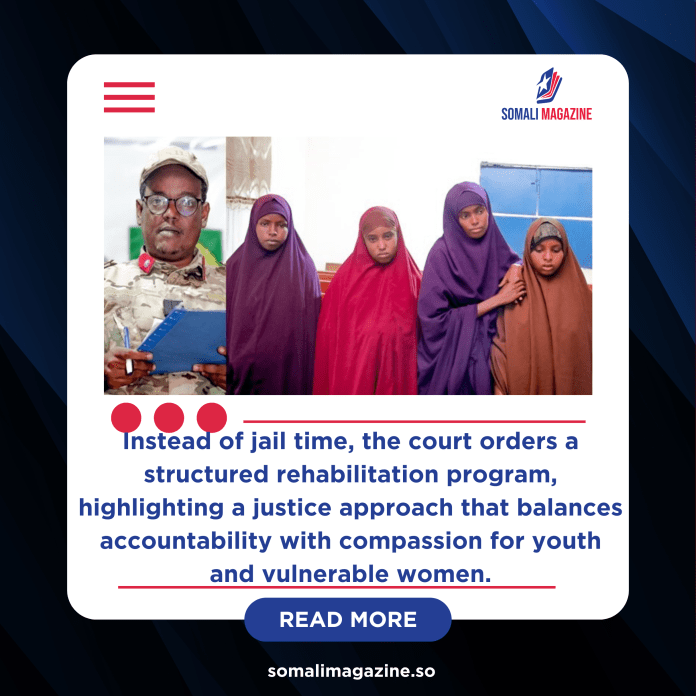Facebook Twitter (X) Instagram Somali Magazine - People's Magazine
A military court in Somalia’s Jubbaland State has sentenced four women to rehabilitation after finding them guilty of sharing intelligence with the militant group al-Shabaab. The women were accused of providing information on military activities and local residents in Buulohaji, an area where the extremist group is active.
The court identified the women as Nasro Nur Osman, Xawo Ibrahim Mohamed, Iqro Farah Abdinur, and Maryan Mohamed Adan. Authorities said the women regularly passed along details that helped al-Shabaab plan and execute attacks. Their actions were seen as a threat to both national security and community safety.
The sentencing took place at the Jubbaland Armed Forces Court. The court session was led by Colonel Abdullahi Mahmuud Ibrahim, who is the court’s chairman. He was joined by his two deputies, military prosecutors, case investigators, and lawyers representing the women. After reviewing the evidence, the court concluded that although the women were guilty, some of them were minors and did not fully understand the consequences of their actions.
Instead of sending the women to prison, the court ordered all four to go through a structured rehabilitation program. The aim of this program is to help them disengage from extremist beliefs and reintegrate into society. Security agencies were instructed to monitor their progress during the program to ensure they do not return to dangerous activities.
The court emphasized that while the justice system must hold people accountable for aiding terrorism, it also has a duty to consider individual circumstances such as age, education, and background. Officials explained that this approach helps in addressing root causes of radicalization, especially among vulnerable groups like young women.
This decision is part of Jubbaland’s wider efforts to reduce al-Shabaab’s presence and influence in the region. Authorities said that punishing supporters of militant groups is important, but long-term peace can only be achieved through prevention and community education. They called for more public awareness campaigns, especially targeting women and young people, to help communities identify and resist extremist recruitment.
Officials also pointed out that many people who get involved with extremist groups do so because they lack education or are pressured by family or community members. They said that rehabilitation gives these individuals a chance to change their path without becoming lifelong criminals.
The court’s ruling sends a message that Somalia is serious about fighting terrorism, but also willing to give people—especially minors—a second chance when appropriate. Local leaders have praised the approach, saying it strikes a balance between justice and compassion.
Jubbaland’s administration continues to work closely with national security forces and community organizations to stop the spread of extremist ideology. This includes supporting former militants who want to leave the group and offering them counseling, education, and job training.
The case of the four women is just one example of how Somalia’s legal system is evolving to handle terrorism-related cases in a way that promotes both accountability and rehabilitation. As the country continues to face security challenges, officials say that a thoughtful and community-based approach is the best way forward.
In the meantime, residents of Buulohaji and nearby areas are being urged to report any suspicious activity and help authorities prevent future threats. The hope is that with stronger cooperation between the public and security forces, Somalia can gradually reduce the influence of groups like al-Shabaab and move toward lasting peace.

